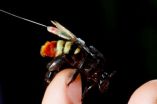(Press-News.org) ITHACA, N.Y. – During Pleistocene era climate changes, neotropical orchid bees that relied on year-round warmth and wet weather found their habitats reduced by 30 to 50 percent, according to a Cornell University study that used computer models and genetic data to understand bee distributions during past climate changes.
In previous studies, researchers have tracked male and female orchid bees and found that while females stay near their nests, male orchid bees travel, with one study concluding they roam as far as 7 kilometers per day. These past findings, corroborated by genetic data in the current study, reveal that males are more mobile than females.
The study, published online in the journal Molecular Ecology, has important implications for future climate changes.
"The dataset tells us that if the tendency is to have lower precipitation in combination with deforestation, the suitable habitat for the bees is going to be reduced," said Margarita López-Uribe, the paper's first author and a graduate student at Cornell.
The good news is that since male orchid bees habitually travel far, they can keep bee populations connected and healthy.
"The males are mediating genetic exchange among populations, maintaining connectivity in spite of fragmentation of habitats," said López-Uribe. "This is a possible mechanism bees could use to ameliorate the negative impacts of population isolation resulting from future climate changes and deforestation."
By looking at current climate and bee distributions, López-Uribe and colleagues assessed parameters of climate conditions that each of three bee species within the genus Eulaema could tolerate physiologically, including temperature and precipitation variability. She found that one of the three species, Eulaema cingulata, was three times more tolerant to a variety of climatic conditions.
By proceeding with the caveat that physiological tolerance has remained constant – species tend to be evolutionarily conservative about shifting their niches – the researchers used computer models to simulate past bee distributions based on climate conditions in the Pleistocene. The results showed that in the past, during periods when the neotropics had lowered precipitation, each species experienced significant reduction in suitable habitat, with E. cingulata maintaining the largest geographical ranges.
Climate and ecological niche computer model simulations were closely matched by genetic data of the two less-tolerant orchid bee species. The genetic data included mitochondrial markers, which are only inherited from females, and nuclear markers, which come from males and females. The mitochondrial DNA showed that individual bees in one geographic area were more closely related to each other than to bees from other areas. The findings suggest the maternal lines of these bees remained in the area and shared the same pools of DNA over time. But the bi-parental nuclear DNA showed more variation between individuals within an area, offering evidence that males traveled and shared their DNA with other regional groups.
Orchid bees live in the neotropics, an ecozone that includes part of South and Central America, the Mexican lowlands and the Caribbean islands. They are one of the most important pollinators, visiting many types of plants, including some 700 species of orchids that are exclusively pollinated by these bees.
INFORMATION:
The study was funded by the Organization of Tropical Studies, Grace Griswold Endowment, Mario Einaudi Center for International Studies, Lewis and Clark Exploration Fund, Explorer's Club Exploration Fund and the National Science Foundation.
Dry future climate could reduce orchid bee habitat
2014-03-19
ELSE PRESS RELEASES FROM THIS DATE:
Diabetes in middle age may lead to brain cell loss later in life
2014-03-19
MINNEAPOLIS – People who develop diabetes and high blood pressure in middle age are more likely to have brain cell loss and other damage to the brain, as well as problems with memory and thinking skills, than people who never have diabetes or high blood pressure or who develop it in old age, according to a new study published in the March 19, 2014, online issue of Neurology®, the medical journal of the American Academy of Neurology. Middle age was defined as age 40 to 64 and old age as age 65 and older.
"Potentially, if we can prevent or control diabetes and high blood ...
Ruling with an iron fist could make your child pack on pounds
2014-03-19
If you're rigid with rules and skimpy on affection and dialogue with your kids, they have a greater chance of being obese, according to research presented at the American Heart Association's Epidemiology & Prevention/Nutrition, Physical Activity & Metabolism Scientific Sessions 2014.
Researchers followed a nationally representative group of 37,577 Canadian children aged 0 to 11. They compared kids whose parents are generally affectionate, have reasonable discussions about behavior with their child and set healthy boundaries (authoritative) with those whose parents were ...
Program taught in American Sign Language helps deaf achieve healthier weight
2014-03-19
A group of deaf adults using American Sign Language in a healthy lifestyle program successfully lost weight, according to a study presented at the American Heart Association's Epidemiology & Prevention/Nutrition, Physical Activity & Metabolism Scientific Sessions 2014.
In the first randomized trial of lifestyle modification or weight reduction with deaf people using American Sign Language (ASL), participants had moderate improvements in their weight and level of physical activity after a 16-week program.
"Existing mainstream programs focused on weight and weight-related ...
Spices and herbs intervention helps adults reduce salt intake
2014-03-19
Teaching people how to flavor food with spices and herbs is considerably more effective at lowering salt intake than having them do it on their own, according to research presented at the American Heart Association's Epidemiology & Prevention/Nutrition, Physical Activity & Metabolism Scientific Sessions 2014.
In the first phase of the study, 55 volunteers ate a low-sodium diet for four weeks. Researchers provided all foods and calorie-containing drinks. Salt is the main source of sodium in food.
In the second phase, half of the study volunteers participated in a 20-week ...
US women unfamiliar with most stroke warning signs
2014-03-19
Many U.S. women don't know most of the warning signs of a stroke, according to research presented at the American Heart Association's Epidemiology and Prevention/Nutrition, Physical Activity and Metabolism 2014 Scientific Sessions.
The study is also published in the American Heart Association journal, Stroke.
In a phone survey of 1,205 U.S. women:
More than half (51 percent) of the women identified sudden weakness or numbness on one side of the face, arms or legs as a warning sign of a stroke.
Less than half (44 percent) identified difficulty speaking or garbled speech ...
Researchers identify impaired new learning in persons with Parkinson's disease
2014-03-19
West Orange, NJ. March 20, 2014. Kessler Foundation scientists collaborated with colleagues in Spain to study memory and learning in patients with Parkinson Disease (PD). They found that the Parkinson group's ability to learn new information was significantly poorer when compared with the control group. The article was published ahead of print on February 24: Chiaravalloti ND, Ibarretxe-Bilbao N, Deluca J, Rusu O, Pena J, García-Gorostiaga I, Ojeda N. The source of the memory impairment in Parkinson's disease: Acquisition versus retrieval. Movement Disorders 2014 Feb 24. ...
Analysis: Industry-sponsored academic inventions spur increased innovation
2014-03-19
Industry-sponsored, academic research leads to innovative patents and licenses, says a new analysis led by Brian Wright, University of California, Berkeley professor of agricultural and resource economics.
The finding calls into question assumptions that corporate support skews science toward inventions that are less accessible and less useful to others than those funded by the government or non-profit organizations.
The analysis, based on a study of two decades of records from the University of California system, is in today's science journal Nature.
The National ...
NASA's Van Allen Probes reveal zebra stripes in space
2014-03-19
Scientists have discovered a new, persistent structure in one of two radiation belts surrounding Earth. NASA's twin Van Allen Probes spacecraft have shown that high-energy electrons in the inner radiation belt display a persistent pattern that resembles slanted zebra stripes. Surprisingly, this structure is produced by the slow rotation of Earth, previously considered incapable of affecting the motion of radiation belt particles, which have velocities approaching the speed of light.
Scientists had previously believed that increased solar wind activity was the primary ...
Sometimes less is more for hungry dogs
2014-03-19
Hungry dogs would be expected to choose alternatives leading to more food rather than less food. But just as with humans and monkeys, they sometimes show a "less is more" effect. Thus conclude Kristina Pattison and Thomas Zentall of the University of Kentucky in the US, who tested the principle by feeding baby carrots and string cheese to ten dogs of various breeds. The findings are published in Springer's journal Animal Cognition.
The research was conducted on dogs that would willingly eat cheese and baby carrots when offered, but showed a preference for the cheese. ...
Alzheimer's prevention trial to monitor reactions to higher disease risk status
2014-03-19
PHILADELPHIA - A new clinical trial will soon begin testing whether early medical intervention in people at risk for Alzheimer's can slow down progression of disease pathology before symptoms emerge, as outlined in Science Translational Medicine. For the first time, people with no Alzheimer's disease symptoms will be told of their risk status before being asked to join the randomized controlled trial. As part of the overall prevention trial, Penn Medicine neurodegenerative ethics experts will monitor how learning about their risk of developing Alzheimer's impacts trial ...


